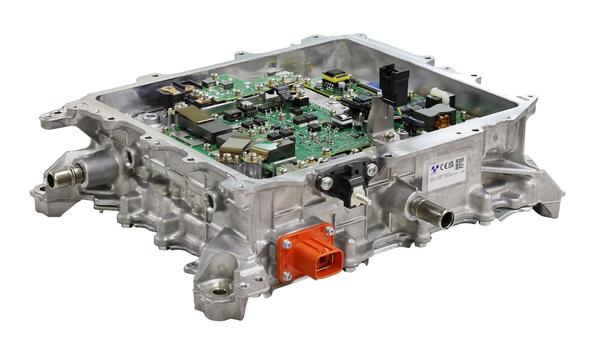Toyota Industries Corporation Develops a New Compact and Lightweight Unit That Integrates an On-Board Charger and DC-DC Converter
Toyota Industries Corporation (President: Akira Onishi; "Toyota Industries") has developed a new compact and lightweight unit for battery electric vehicles (BEVs) that integrates an on-board charger and DC-DC converter. Incorporated in the electricity supply unit (ESU)*1, which Toyota Motor Corporation adopted for BEVs for the first time, the product serves as a core unit for charging and power conversion functions. It is mounted in the all-new bZ4X BEV launched on April 12, 2022.
By integrating an on-board charger and DC-DC converter essential for BEV, the new unit is 23% smaller in size and 17% lighter in weight versus separately mounting the two devices. This improvement has also contributed to providing more interior space as well as lowering the center of gravity of the dedicated BEV platform adopted in the bZ series.
An on-board charger converts AC voltage from the power grid into DC voltage in vehicles and is necessary for charging the high-voltage batteries of BEVs. A DC-DC converter is a power supply unit that converts the DC voltage into a lower voltage level to supply power to standard electrical devices. Specifically, it converts the high voltage of BEV batteries (355V) to a 12V voltage level and powers an auxiliary battery, electrical control unit (ECU), navigation system and lights.
Since the 1990s, Toyota Industries has been developing and producing on-board chargers and DC-DC converters for Toyota Motor Corporation 's hybrid electric vehicles and other electrified vehicles along with refining its power electronics technologies. Utilizing its accumulated technologies and experience, Toyota Industries has developed a dedicated control IC and power module for the new unit. A cooling water channel inside the unit case was also placed to improve heat dissipation by configurationally mounting an on-board charger and DC-DC converter on both sides of the water channel, thereby contributing to a significant reduction in size and weight.
As the electrified vehicle market grows rapidly to realize carbon neutrality by 2050, the necessity of power electronics technologies that underlie the functionality of electrified vehicles, including flexible conversion and control as well as the efficient use of electric energy, will further increase.
Toyota Industries remains committed to developing compact, lightweight and highly efficient power electronics technologies while continuing to provide car electronics products, including the newly unveiled unit that integrates an on-board charger and DC-DC converter, to support the wider use of electrified vehicles.
| *1: | A device that integrates the charging function and power distribution function of battery electric vehicles (manufactured by DENSO Corporation) |

